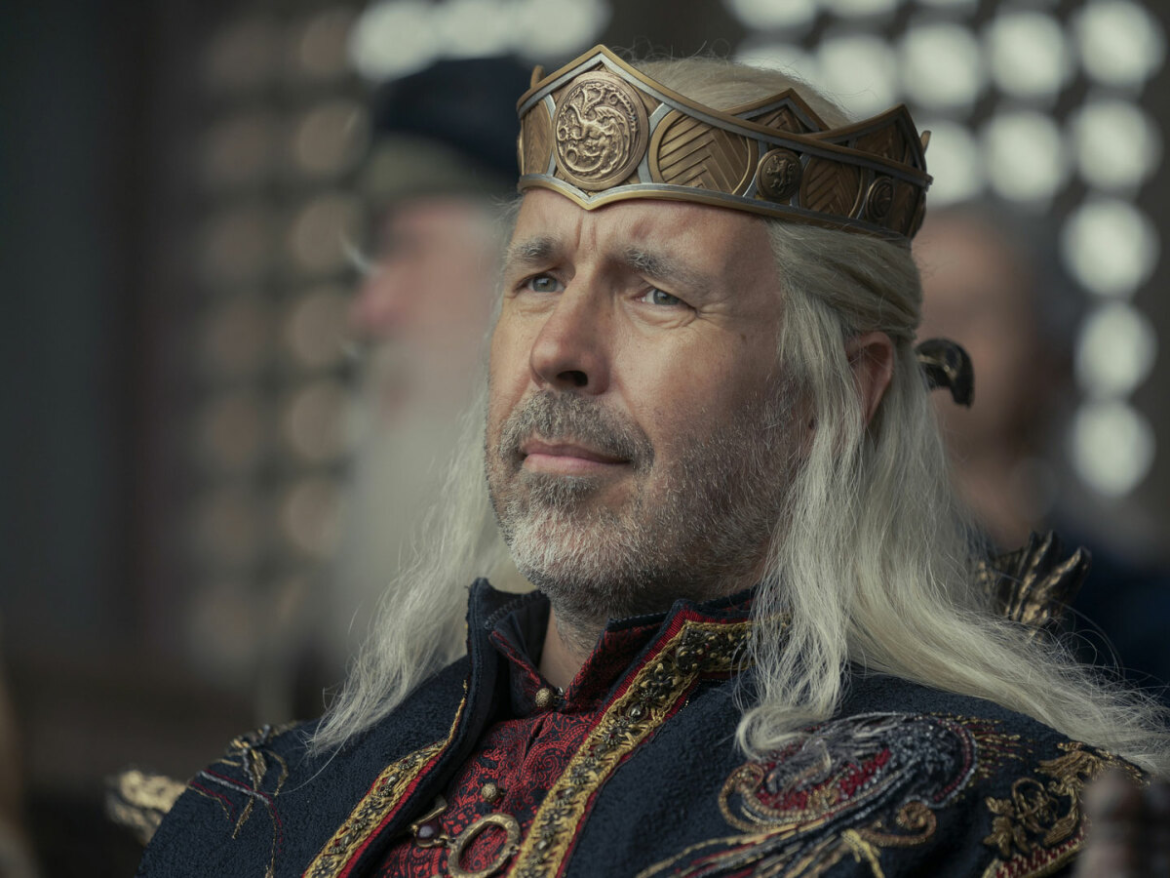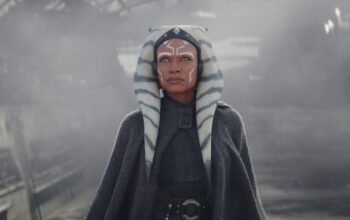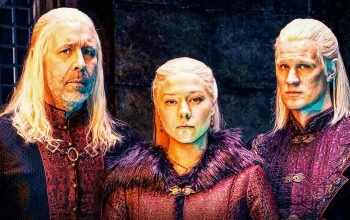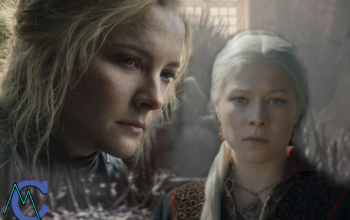It has been roughly a year since HBO’s House of the Dragon [HotD] breathed new life into the Game of Thrones fan base. As such, we believe now is an appropriate time to take a look back at this unexpectedly successful series.
Long Live the King

HotD follows much of the same formula as GoT, focusing on complex characters as they play their own powerplay for the Iron Throne. No doubt the feud between the Blacks Rhaenyra/Daemon vs. Alicent/Otto is the central drive of the series. A battle between blood rights and tradition in itself would be worthy of the drama of this series, but none of this would have been possible without understanding its reigning monarch, King Viserys I.

Viserys is by far the best character of the first season of HotD. This is one of those characters that has left the audience with so many conflicting feelings. Many people will absolutely wonder how can we speak positively of a character that would effectively doom his entire kingdom to a civil war. Well, the answer is the same as every form of media, and that is writing.
The reason this story works is that everything about Viserys in this story is raw and genuine. Beyond this good guy facade, there is a deep personal struggle with how this character was developed.
The series started from the very beginning that he was never meant to be king; he was the son of King Jaehaerys‘ second-born, Baelon. Being this far down the succession makes Viserys ill-prepared for the task at hand.
Family History and the Great Council
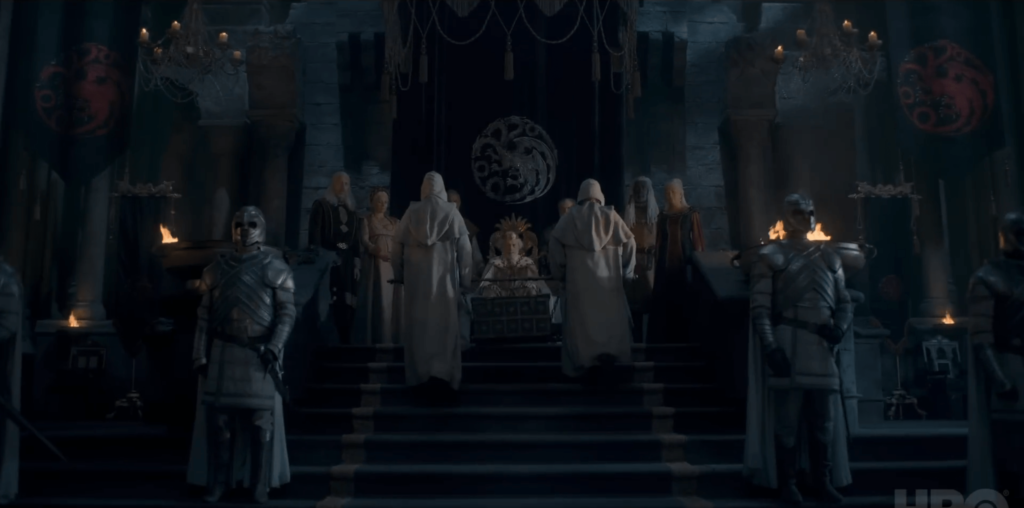
To understand Viserys, we must first discuss his Grandfather, King Jaehaerys I. Ascending the throne at 14, Jaehaerys effectively ruled for half of the Targaryen dynasty up to this point, ascending the throne after the turmoil of his tyrannical uncle Meagor the Cruel (son of Aegon the Conqueror). Jaehaerys was a beloved monarch who reformed seven kingdoms from a mere collection of vassals to a unified realm.
King Jaehaerys had two sons that survived to adulthood: Aemond (Father of Rhaenys) and Baelon. Both sons were renowned warriors, but they died before their father could formally name them his heir—one by a botched assassination, the other by a burst belly.
The death of his sons caused a serious succession crisis, hence the great council of 101 A.C. (After Conquest). The formal purpose was to settle a formal heir for the increasingly frail king. Rhaenys was the eldest daughter of Jaehaery’s firstborn son, making her a top contender.
Fun Fact: In the book, it was actually Rhaenys’ son, Leanor Volarion, who was a contender at the Great Council

This is another element in Game of Thrones that reflects the History of early Norman England. After Aegon the Conqueror died, there were serious power disputes with his sons Aneas and Meagor. This was equally reflected in William the 1st, the Conqueror, and his sons William Rufus, Robert, and Henry. A key theme presented here is that when it comes to family dynasties, their sons rarely live up to the success of their fathers.
Viserys succession was the first time since Aegon’s conquest that the Iron Thrown was passed peacefully to a successor. Viserys may not have sought to be king, but once he dawned the crown of his grandfather he took the responsibility of living up to the name of his great family.
A Dream of Valyria
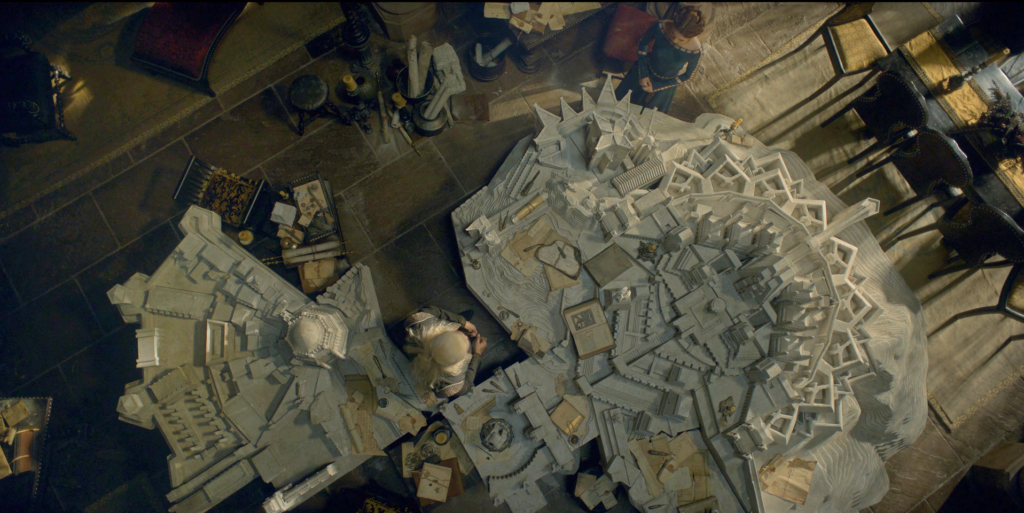
Despite his sigil, Viserys was very distant when it came to dragons themselves. He was the last rider of Balarion the Dread before the old dragon passed, which can be seen by some as an ill omen. Viserys may not have been fond of Balerion, and yet he still felt a connection with him as he was the last living memory of old Valyria before the doom. His obsession with old Valyria is very apparent since he keeps a module of the ancient Freehold (city-state).
Despite not being a dragon rider, Viserys firmly believed in prophecy like his ancestors. Among them is a male baby with a crowned on the very throne he sat upon.
The Heir-Apparent

Despite his well-intentioned nature, Viserys is far from morally perfect. Many would say his decision to name his daughter his heir and not his son is an example of poor governance. Naming a female heir ahead of a living son could be seen as sacrilege in a misogynistic society that’s all too prevalent in this medieval world and possesses great risk for the realm. However, his flaws don’t stop there.
Easily the most controversial moment in the series was his decision to give his wife Aemma a fatal C-section without his wife’s consent. Viserys clearly loved his wife, Aemma, but was obsessed with having a son at all costs. It was that choice that would haunt him for the rest of his life.
Aemma’s death was the catalyst that drove the entire story and was the beginning of Viserys’ character arc. For years he believed having a son would fulfill that dream he’d been having all those years, only for it to be shattered. Grief-stricken and perhaps believing he forgot what it meant to be a father, Viserys names his only daughter, Rhaenyra, his heir.
Even after his horrific decision, Viserys does tread a fine line between morally good and objectively creepy. Being a King who’s single automatically makes him the most eligible bachelor in the seven kingdoms. Despite not wanting to marry a 12-year-old Laena that many in his court advised, he seems to have no qualms about remarrying someone the same age as his daughter.
In fairness, this wasn’t Visery’s initial desire either as this was part of a ploy by his hand Ser Otto to put more power behind the thrown by carefully manipulating his daughter to come to the king’s chambers in a time of grief.
At first, Viserys had no will to remarry but was constantly under pressure from his advisors to do so. Viserys likely thought to himself that if he was going to remarry someone, it may as well be someone he knows or at least feels comfortable talking to. that’s what he felt when talking to Alicent, as he thought she was the only person he could express his problems with during his grief. Soon enough, Viserys has not just one but two of the sons he always wanted. However, his desire to place his firstborn son on the throne no longer interested him as it had before.
Importance of the White Heart Hunt
The 3rd episode Second of His Name, may be overlooked, but it gives some very crucial insight into his mental state. With Aegon born, it was presumed by many that the order of succession would change. This fact was not unknown to Viserys as he’s often been hampered by the Realm’s bachelors for his Daughters’ hand. Viserys’s hunt was something of a personal test for him, not just because hunting is expected of royals. With reports of a white stag (known in the universe and history as “the white heart”) appearing on Aegon’s birthday, many lords suggest this was a sign of Aegon’s right to succeed.
Later in the episode, he sees a stag, Realizing it isn’t the white one promised by his council. Viserys never had the hunting talents of his family and understandably struggled to deliver the killing blow. And yet, at the same time, a part of him felt a sense of relief it reaffirmed his belief that his daughter was his rightful successor.
Aegon’s Dream

The “Prophecy of Ice and Fire” plot point has divided some fans wanting to distance themselves from the disaster of the finale season of Game of Thrones. However, in full context, this does give Viserys a reason for naming Rhaenyra his heir, as it has always been a prophecy handed down secretly from king to heir. The preservation of this great secret was the responsibility of every successor to keep. The moment Viserys passed on Rhaenyra this secret, there was no turning back.
Relationship with Daemon
The character of Viserys is seen most revealing whenever he’s paired with his brother Dameon. Despite being warned about Dameon’s reputation for years, he does not give him any serious punishments because he would never harm his own blood.
Despite banishing him from court twice, Viserys never seems to keep his brother away for long. He never has the stomach for personal confrontation, and that is evident when Dameon shows up to Rheanyra’s wedding uninvited, and Viserys begrudgingly gives him a chair.
Despite the animosity over the past 20 years, they still have an unspoken love for each other. Dameon is the only one who can speak the truth to his face, even telling him he’s weak. Interestingly it’s not used as an insult, but plain advice that Visery’s council is just vultures flying around his power. Viserys accepts that advice in his own way, but never wants to admit it. One of his fears was Dameon would prove himself as a true heir, and he wasn’t going to give him that free a hand.
The Importance of THAT Scene

Viserys’ entrance in episode 8 was his last hoorah in this series. He’s been bedridden for some time when we are reintroduced to Viserys after the six-year jump. By this point, Viserys knows he’s on his last legs and wants a certain level of closure with his family. Most important, he believed in protecting the legacy he saw in Rhaenyra. At this point, this was not a king who made a proclamation but a father standing up for his child.
Even then he could not climb the steps and in the end, was helped by the most unlikely person in his estranged brother Dameon. For years Dameon plotted, manipulated, and scurried around his king’s demands, Despite their relationship being strained at their core, they were brothers who have each other’s backs.
The “Last Supper” scene is also equally impactful when Viserys sees both his daughter and grandson dancing (eww). He gives a faint smile with a slight sense of happiness, the slightest sense of satisfaction with him being with family, something he feels has been lost. At its core, Game of Thrones is about family, even if it’s a dysfunctional one.
This is the biggest Tragedy of Viserys. Despite all attempts to repair his family, it is at a point of no return. The consequences of his choosing his daughter over his son plunged his family dynasty into a civil war from which they would never fully recover. It was a tragedy built on a father’s love. In the end, Viserys’ line would continue through Rhaenyra’s line, but a whole war would follow to realize that.
Conclusion

Game of Thrones has always been a show about morally grey characters. Viserys was one of those few kings who was a good person at heart. Even his grandfather had to make morally questionable choices to preserve “the realm,”. Viserys didn’t care about any of that but the love of his family. He makes tragic mistakes but tries to own up to them. Even when Viserys makes a decision he knows may be wrong, he commits to it because that’s what he believes in and stays that course until the end.
It’s rare for a character to make objectively terrible decisions in life and make us root for them. What matters in every story is context. Whether you agree with his choices or not, his feelings are clear to the audience, and they will follow his story regardless. That is the kind of story that Game of Thrones is at its best.

Furthermore, I Do have to give Paddy Considine for perfectly capturing the character and elevating him. His performance is a role very few actors can accomplish, Taking him to a level I never thought possible. He captures every aspect described in the book, including his sadness, frustration, anger, love, softness, and sincerity. There’s a reason the opening title card mentions Paddy Constantine. First, he was the fulcrum that held the first season together, and now he has gone, it will spread out into these roles.
Viserys is not just the Ned Stark of the series because he dies; it’s because Viserys is a noble character who always does the right thing, even if it consumes him. It is these qualities that Game of Thrones excels at, and I really look forward to next season because of this role. It shows that despite the fallout from the finale season, Game of Thrones still has plenty of life left.
